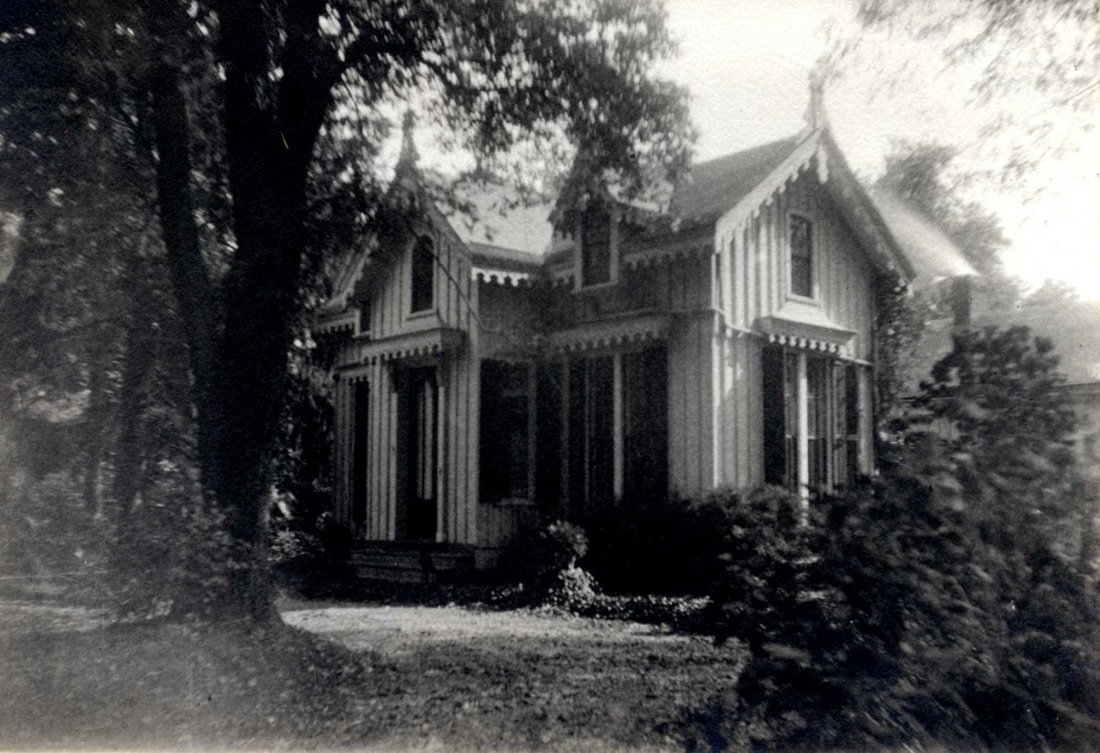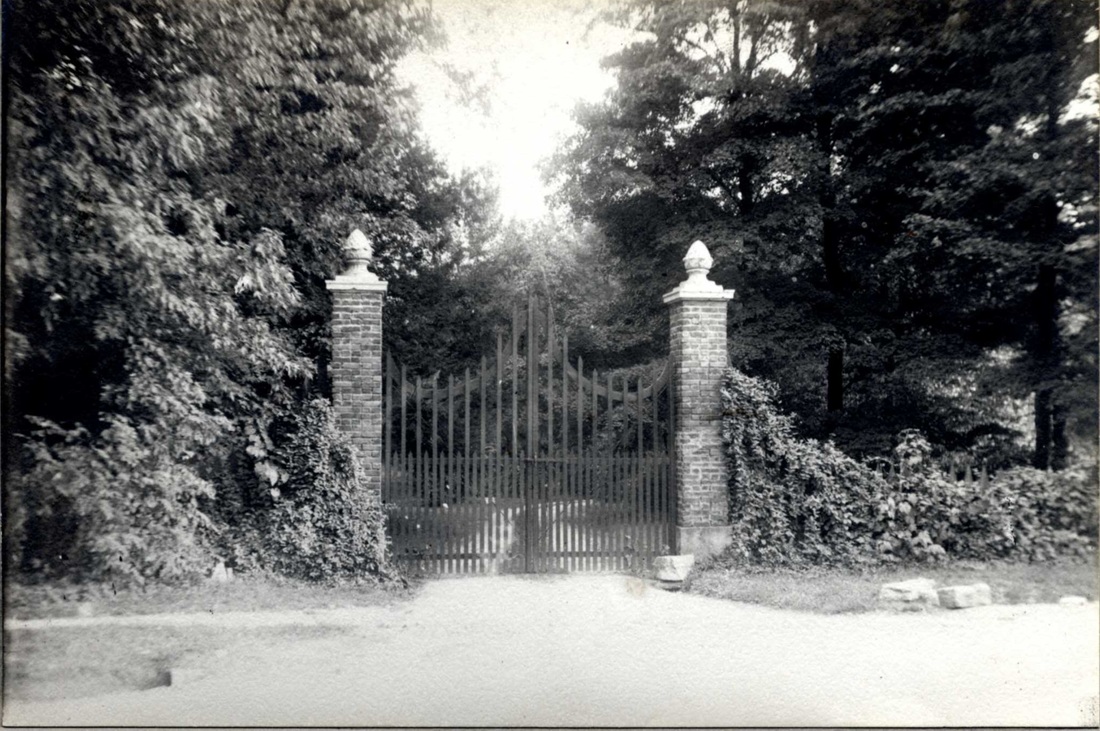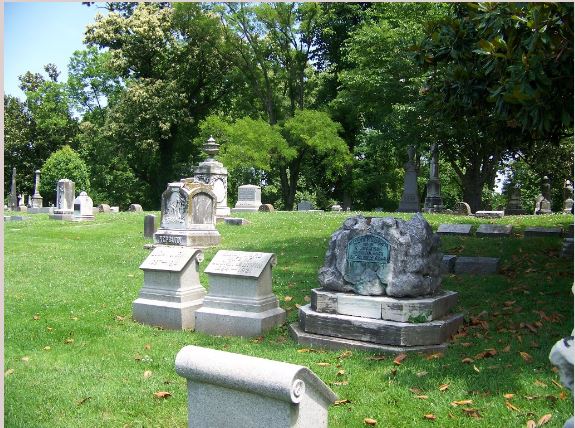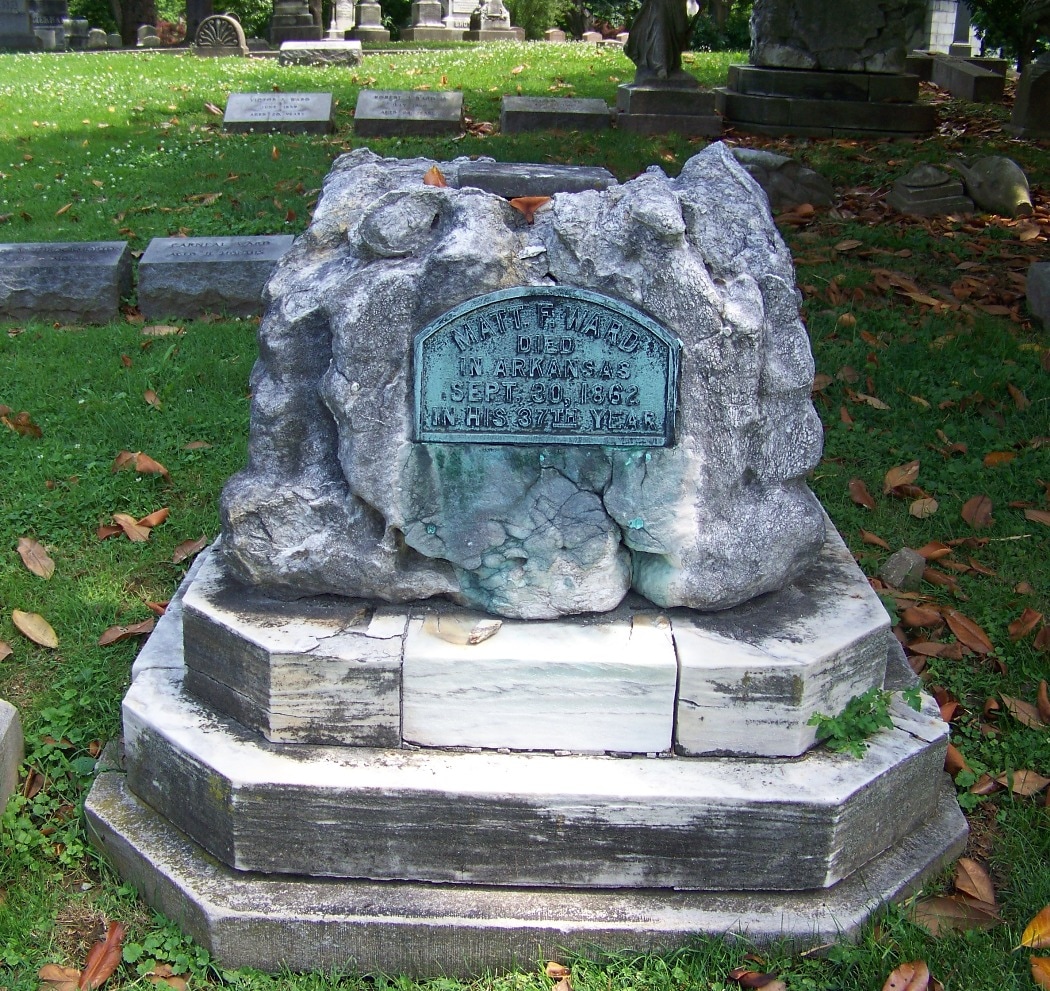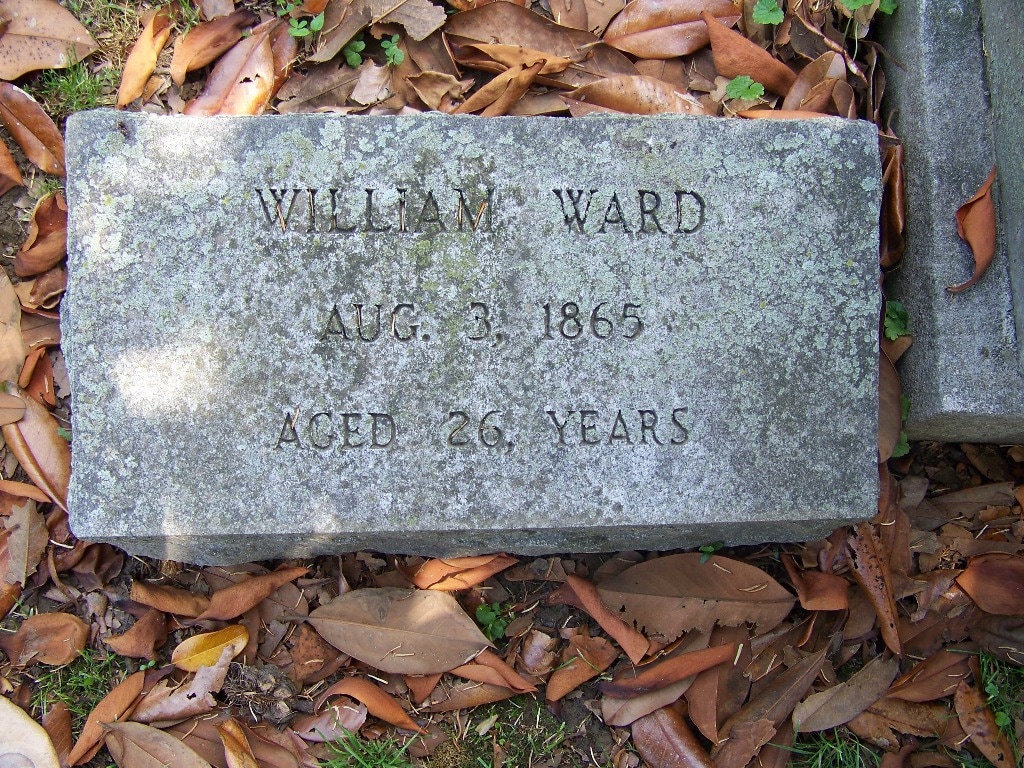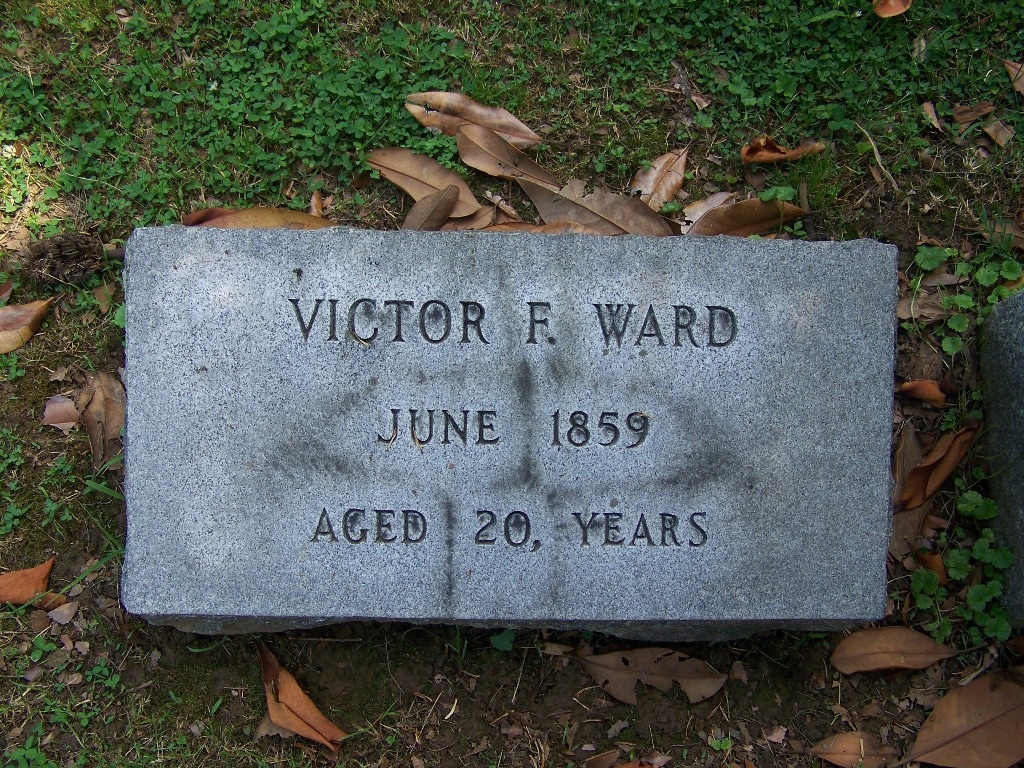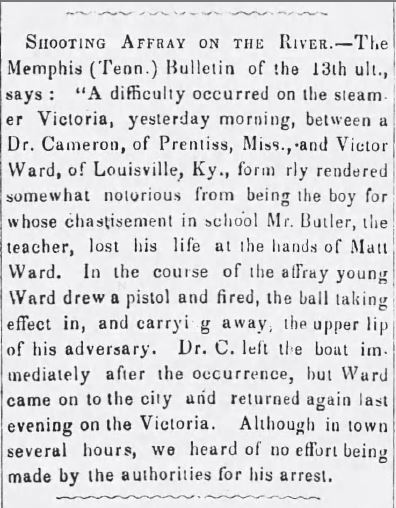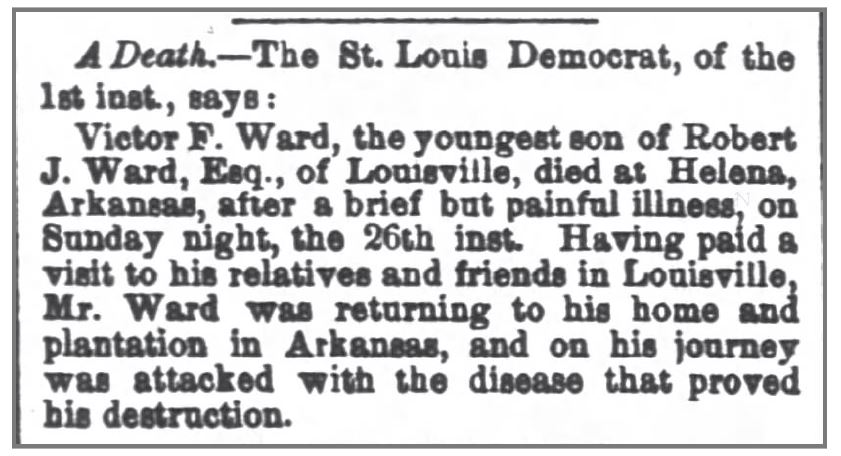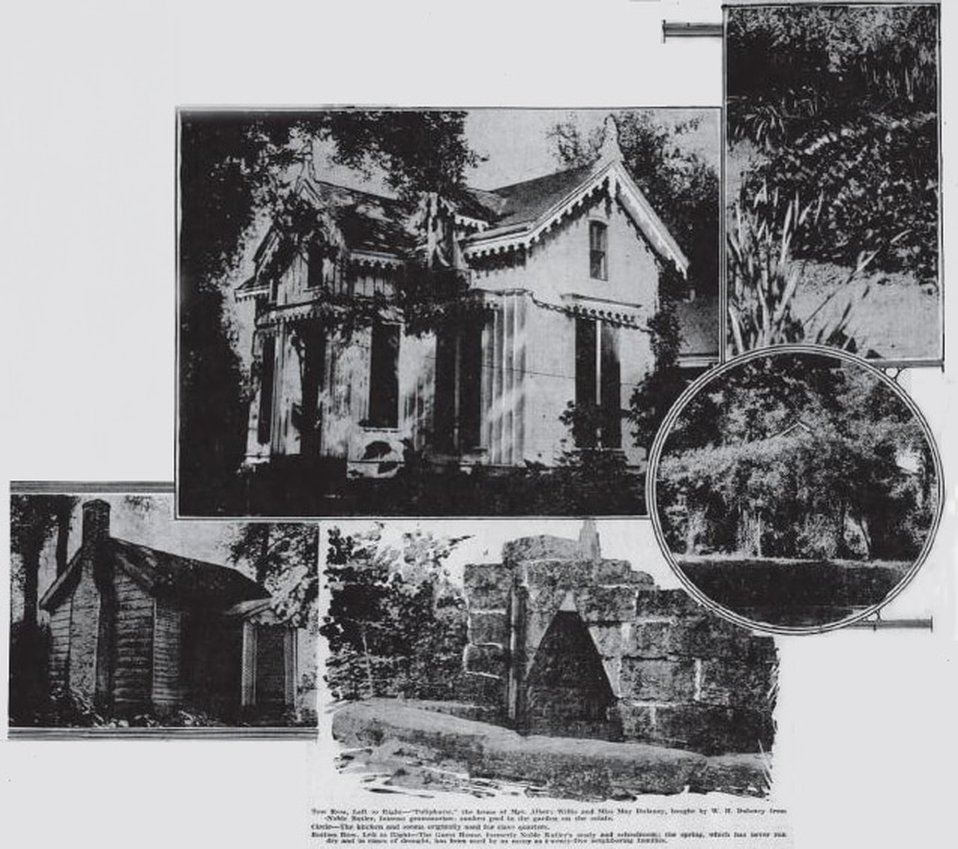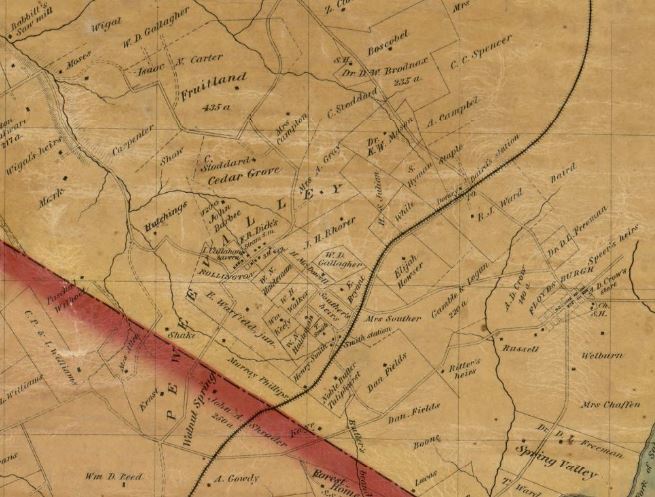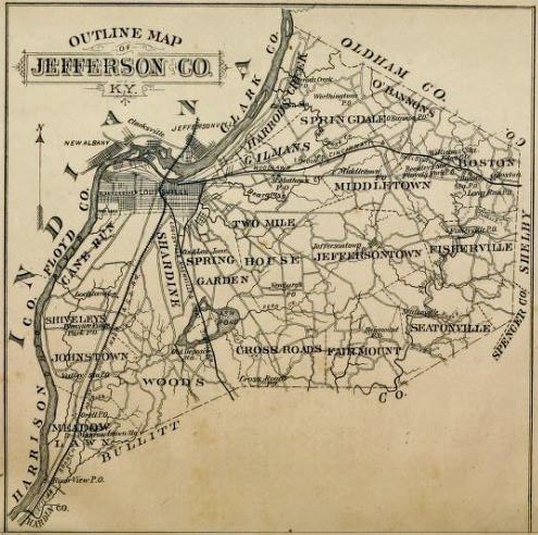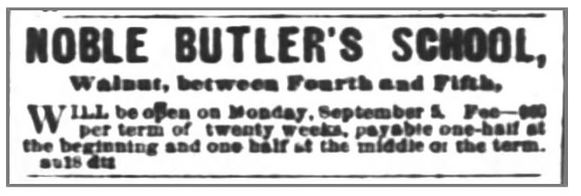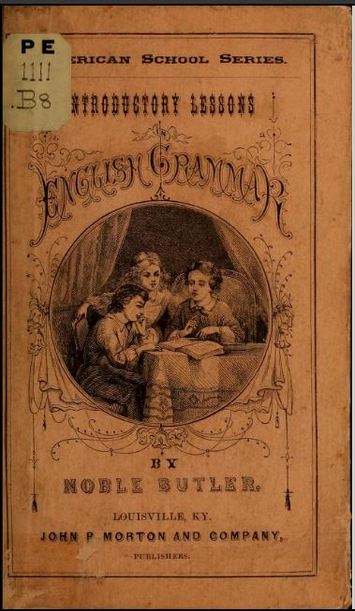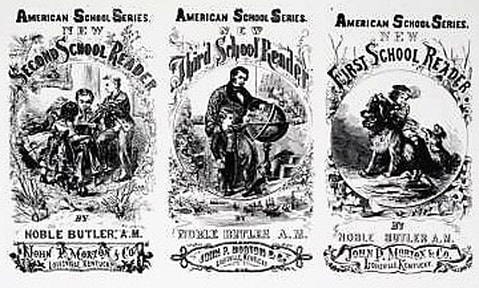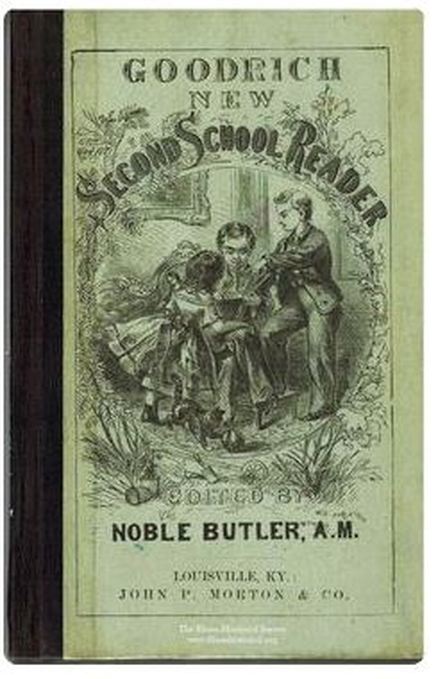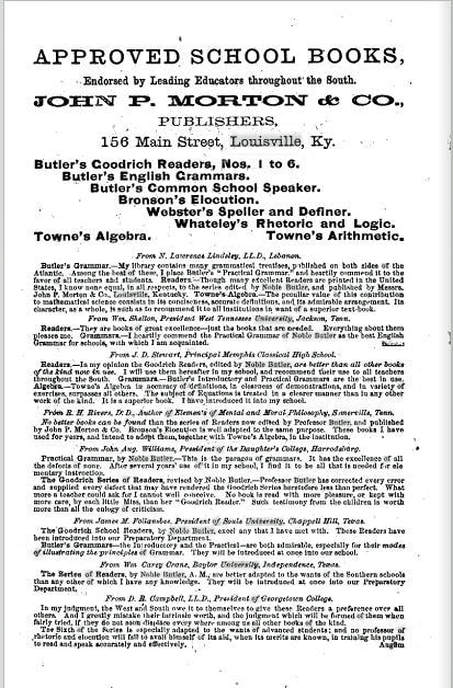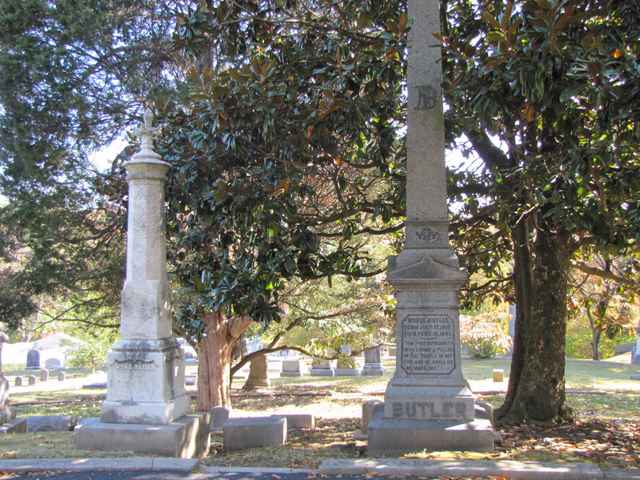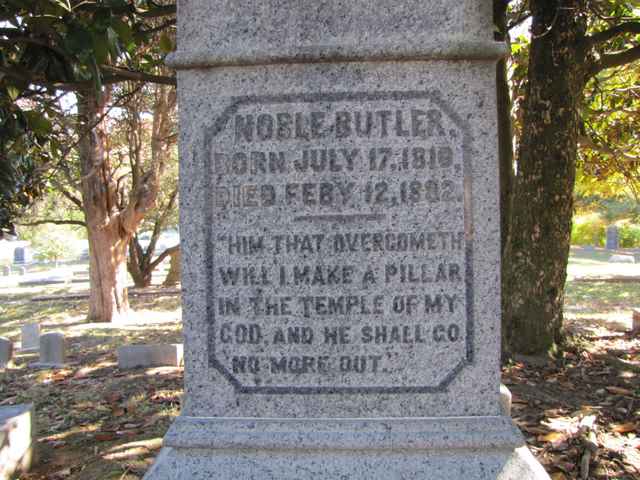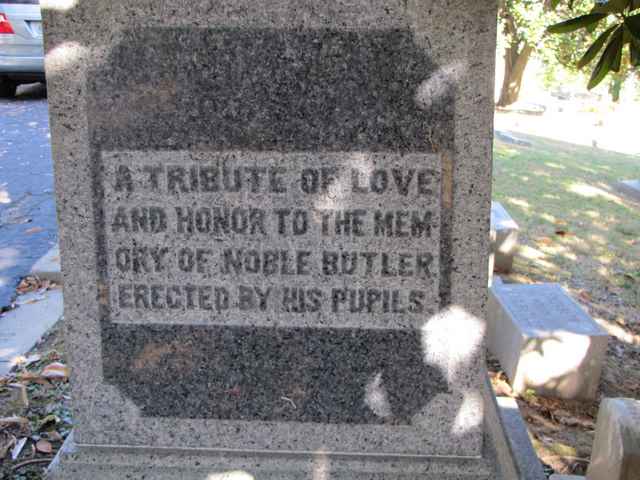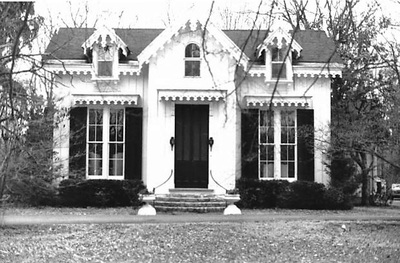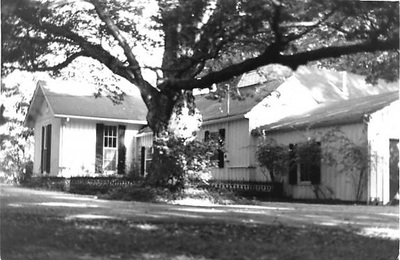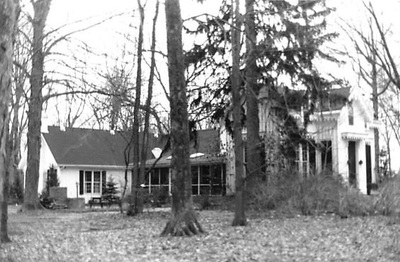Tuliphurst: The Noble Butler Years 1854-1864
Like the Middle East’s Fertile Crescent, Tuliphurst could be referred to as the cradle of civilization in Pewee Valley. Not that earlier settlers, such as the Smiths, the Clores, the Yagers, the Southers, the Brennans, the Boulewares, the Barbees and the Babbitts, didn’t improve the land or appreciate the area’s natural beauty. But it was Tuliphurst’s builder, Noble Butler, who gave the town its memorable name and claimed it as a haven for free spirits, a reputation it still enjoys today.
According to the Statement of Significance submitted to the National Register of Historic Places by Historic Pewee Valley:
…Butler, who received an honorary Master of Arts degree from Harvard University in recognition of his contributions to education, was a professor of Greek and Latin in the early years of Louisville College, now the University of Louisville, during the 1840s. Later he taught at several different private schools in Louisville as well as writing his English Grammar, a textbook which was widely distributed in Kentucky and elsewhere. Other textbooks he authored included Butlers Readers and Practical and Critical Grammar. Butler, who purchased much of the Tuliphurst property in 1854, is believed to have built the small two-room cottage soon after. He was clearly a leader of the early group of suburban residents and… is widely credited with conferring the name "Pewee Valley" upon the community. Also while living in Pewee Valley he chronicled the arrival in the area of the first group of suburban residents in a quaint little publication entitled "Antiquitates Peweeji" which survives today in a reprinted format.
According to the Statement of Significance submitted to the National Register of Historic Places by Historic Pewee Valley:
…Butler, who received an honorary Master of Arts degree from Harvard University in recognition of his contributions to education, was a professor of Greek and Latin in the early years of Louisville College, now the University of Louisville, during the 1840s. Later he taught at several different private schools in Louisville as well as writing his English Grammar, a textbook which was widely distributed in Kentucky and elsewhere. Other textbooks he authored included Butlers Readers and Practical and Critical Grammar. Butler, who purchased much of the Tuliphurst property in 1854, is believed to have built the small two-room cottage soon after. He was clearly a leader of the early group of suburban residents and… is widely credited with conferring the name "Pewee Valley" upon the community. Also while living in Pewee Valley he chronicled the arrival in the area of the first group of suburban residents in a quaint little publication entitled "Antiquitates Peweeji" which survives today in a reprinted format.
Butler Family
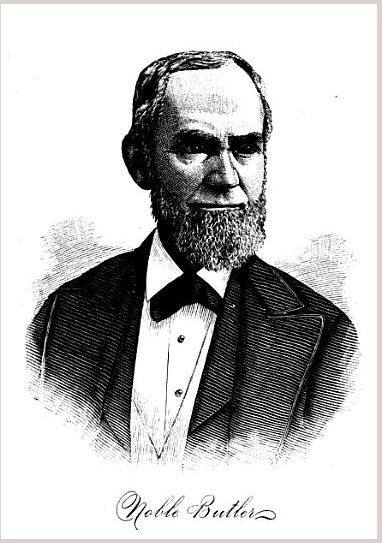 Portrait from "History of the Ohio Falls Cities and Their Counties, with illustrations and bibliographical sketches,"
by Williams, L.A., & Co., Cleveland, 1882
Portrait from "History of the Ohio Falls Cities and Their Counties, with illustrations and bibliographical sketches,"
by Williams, L.A., & Co., Cleveland, 1882
Noble Butler was born July 17, 1810, in Pennsylvania. "History of the Ohio Falls Cities and Their Counties: General history. History of Jefferson County, Ky. The history of Louisville" (L. A. Williams & Company, Clark County (Ind.); 1882) provides an excellent and detailed biography of the man who bestowed Pewee Valley with its memorable name:
... In 1817 the family removed to the wilds of Indiana, and settled in what is now Jefferson county. The boy was then seven years old, and his elementary education, apart from the invaluable training of the fireside, began here, in the primitive log school-houses of the wilderness. He early evinced a decided aptitude for learning, developed rapidly in scholarship and mental power, and for nearly twenty years pushed his way energetically through the various grades of schools accessible to him, graduating at length in 1836, at the age of twenty-six, from the well-known Quaker institution known as Hanover College, at Richmond, Indiana. His attainments were so marked, and his personal habits so approved, that he was promptly offered the chair of Greek and Latin in the same institution. He had, in the pursuit of the higher education, cherished the hope of entering the Christian ministry; but finding himself, as he always was, singularly lacking in the power of public speech, he abandoned this purpose, accepted the post in the College, and served it acceptably for three years, when, in 1839, he came to Louisville for a broader and more congenial field, which he occupied with signal usefulness and success during the next forty-three years.
He opened at first a private school; but the attention of the governing Board of the Louisville College was soon attracted to his pedagogic abilities; and the next year, when the College received its charter, he was elected to its Faculty as Professor of Ancient Languages. It was an able corps of instructors to whose association he was invited, and his was one of the brightest and best names among them...
After leaving the College, most of the labors of Mr. Butler as a teacher were expended in select and private schools, in which he was greatly influential in moulding the minds and manners of many of the finest young people of two generations in Louisville and much of the entire South. Some years ago he received, in recognition of his fame, the honorary degree of Master of Arts from Harvard University (Editor's note: in 1845). His alma mater also bestowed upon him the degree of Doctor of Laws (Editor's note: in 1875) ...
On October 26, a few months after his 1836 graduation from Hanover College, he married Lucinda Harney (1810-1933). She was John H. Harney's sister, and Noble probably made her acquaintance while he was a student at Hanover. Harney had begun teaching in Hanover's math department in 1833, while Noble was a student there. Three years later, in 1839, Noble followed him to the Louisville College, when John was named president. Harney would later become the editor of the Louisville Democrat. (Editor's note: In 1862, John Harney purchased Walter Haldeman's printing equipment from the Louisville Daily Courier for $6,150 when it was auctioned after Haldeman fled Louisville and joined the confederacy. Haldeman returned the favor when he came back to Louisville after the war. He bought out the Louisville Democrat in 1868, the day after publishing the first issue of the Courier-Journal. )
Noble and Lucinda had five children, three girls and two boys:
- Jonathan Selby Butler (February 7, 1840-?), who joined the 13th Kentucky Volunteer Infantry at the outbreak of the Civil War. In 1863, he was acting assistant adjutant general and chief of staff to Brigadier Gen. E.H. Hobson when he captured John Hunt Morgan in Ohio after his famous raid. Later in the war, he was appointed by President Abraham Lincoln as assistant adjutant general of U.S. Volunteers. He was assigned to special duty in Louisville and served under General Palmer until he was mustered out in 1865. He practiced law in both Louisville and Salem, Ind., and moved to Chicago in 1882, where he was secretary-treasurer of the Illinois Gas Company. He married Addie Percise, of Salem, Ind.
- Anne Irene Butler May (January 12, 1841-November 14, 1912), married Benoni A. May, who served in Company G, 13th Indiana Infantry, U.S.A. as a sergeant during the Civil War. She died in Chicago, Ill., and is buried in Cave Hill. Census records for 1850 and 1860 show she was actually born a few years earlier, before her brother, Johathan.
- William Patterson Butler (April 16, 1843-July 13, 1902), graduated from West Point Military Academy and served in the regular army in ordnance; married Florence Ella Rodman, the daughter of General Thomas Jackson Rodham, who developed the Rodman gun; was elected as Mayor of Rock Island, Ill., ; moved to Chicago in 1879 and became president of the Illinois Gas Company; buried San Francisco National Cemetery.
- Mary Alan Butler Hewes (? -1884), married E.A. Hewes
- Wilhelmina "Minnie" Butler (November 3, 1855-1927)
In August 1850, the family was living in Louisville District 2 near James Guthrie, and Noble was working as principal of Louisville High School.
Family Tragedy and the Move to Pewee Valley
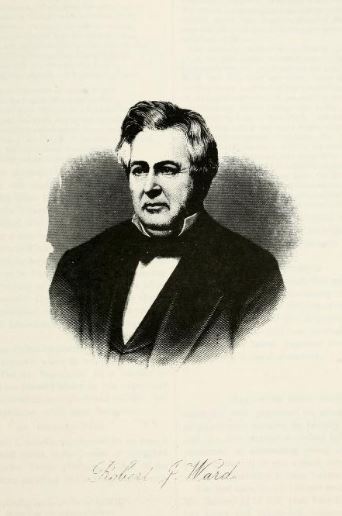 Robert J. Ward, Matt Ward's wealthy father, was part-owner of a mercantile firm in New Orleans. The 1850 census showed his Walnut Street home in Louisville was valued at $80,000 -- the equivalent of $2.4 million today. From "History of the Ohio Falls Cities and Their Counties, with illustrations and bibliographical sketches,"
by Williams, L.A., & Co., Cleveland, 1882
Robert J. Ward, Matt Ward's wealthy father, was part-owner of a mercantile firm in New Orleans. The 1850 census showed his Walnut Street home in Louisville was valued at $80,000 -- the equivalent of $2.4 million today. From "History of the Ohio Falls Cities and Their Counties, with illustrations and bibliographical sketches,"
by Williams, L.A., & Co., Cleveland, 1882
What brought the popular professor and his family to Pewee Valley in 1854 was a terrible tragedy: the cold-blooded murder of his brother, William H. Gregg Butler, on November 2, in full view of his students at Louisville High School. After his brother's death, Noble moved to Pewee Valley seeking solace and healing in nature.
Although fourteen years apart in age, the brothers were close and shared not only the bond of blood, but the bond of their profession. When the 1850 census was taken, William and another teacher were living with Noble, his wife and four of their children in Louisville. Melville Otter Briney, writing for the June 27, 1926 Courier-Journal, recounted the story of the sensational murder and subsequent trial and acquittal of wealthy shooter Matt Ward in a story called, "Pewee Valley's Home Was Author's Retreat:"
... In his Pewee Valley home his five children grew up ( (Editor's note: He actually had six and several had left the nest before his move to Pewee Valley) , and it is here that Butler supposedly spent his happiest times. Unhappy memories, too, lingered about the house, for there, in 1853, following his brother's tragic death and the notoriety it occasioned in Louisville, he shut himself away from the world. There, in the quiet of the country, and in the outward peacefulness of his life, he found some relief for his sorrow.
The killing of William H.G. Butler, principal of the Louisville High School and brother of Noble Butler, by Matt F. Ward in the school room in the presence of the scholars, and the subsequent trial and acquittal of Ward in 1854 has gone down in Kentucky history as one of the most spectacular tragedies. The prominence of the two men who were engaged in the difficulty, the circumstances under which the fatal shooting occurred, and the prominence of the lawyers, both for the prosecution and for the defense, made it one of the most celebrated trials ever held in the State.
A small incident in the schoolroom is said to have brought about the tragedy. William Ward, a younger brother of Matt, was reprimanded by Butler for having eaten some chestnuts in school. Young Ward denied it, whereupon Prof. Butler accused him of telling a lie and whipped him. The next day, November 2, 1853, Matt Ward, accompanied by William and another brother, Robert Ward, Jr., came into the schoolroom and demanded an explanation from Butler for his treatment of William. A quarrel followed, and Matt Ward drew a pistol and shot Butler. He died the following day.
In April, 1854, a jury rendered a verdict of "not guilty" for Ward, following a very eloquent and moving speech by John J. Crittenden, of Frankfort, for the defense. In speaking of Crittenden, Alfred Allen, Commonwealth's Attorney, in closing the argument for the Commonwealth, said he thought "one man could not in a lifetime make two such speeches as the one he just heard."
Two days after the trial over 8,000 persons gathered in a public meeting in Louisville to protest the verdict. Feelings ran so high that effigies of Ward, his brother, and his legal counsel were burned in the streets of the city. The beautiful home of Matt Ward's father, Robert, was stoned by the mob, the windows destroyed, and the glass conservatory, filled with rare and beautiful plants, demolished. Even an attempt to set fire to the house was made, but was said to have been checked by firemen...
On April 29, Noble put aside his own grief and outrage and issued a broadside "To the People of Louisville" asking them to "stay the hand of violence and act calmly and prudently" in spite of the "infamous verdict."
An excellent account of "The Trial of Matt F. Ward" complete with Crittenden's impassioned closing argument is included in Famous Kentucky Tragedies and Trials: A Collection of Important and Interesting Tragedies and Criminal Trials which Have Taken Place in Kentucky by Lewis Franklin Johnson (Baldwin law book Company, Inc.: 1916).
Ohio Valley History, Vol. 2, No. 2 Summer 2004 offers a detailed account of the events leading up to the shooting as well as the trial called, "Murder in the Classroom: Privilege, Honor, and Cultural Violence in Antebellum Louisville," by Ann Hassenpflug.
What Became of the Wards: Divine Retribution?
The Daily Milwaukee News, Milwaukee, Wisconsin: February 11, 1863
REPORT FROM ARKANSAS -- Mat. Ward -- Fearful Retribution
Almost everyone who reads newspapers will remember that in 1852 the community of Louisville, Ky., were terribly startled one afternoon by the sad intelligence that Noble Butler (editor's note: he killed Noble's brother, William), a New England scholar, for many years a popular teacher in that city, a man of education, refinement and ability, had fallen at the hands of an assassin, and his murderer was none other than Matt F. Ward, the son of one of the first families of Kentucky, himself an educated and popular specimen of southern chivalry. The immediate cause of that terrible catastrophe was the chastisement of the younger brother of Mr. Ward by the usher for some grievous and insulting offence. Mr. Ward, hearing of the just punishment inflicted, light and not unusual, suffered his southern blood to be so inflamed with passion that he entered the schoolroom without bidding and shot down the unsuspecting teacher without warning. We well remember one of the leading pictorials of the day a wood cut representing a man in sporting costume walking down the roads of Kentucky. Meeting a farmer he asked --
"My friend, is there any good shooting in this section?"
"Yes -- Yankee schoolmasters."
For the murder Mr. Ward was arrested and tried, John C. Breckenridge and John J. Crittenden defending him so ably that in connection with family influence, great wealth, and social and political appliances, his neck was saved from the halter. But an outraged community would not tolerate his presence so he fled. For awhile he roamed through Texas, then opened a plantation (near Helena, Ark.) ...
My landlady has kindly permitted me to peruse a work called "English Items," being a criticism on the work of English tourists...(The humorous depiction of Arkansas below is taken from that volume)...
"The territory of Arkansas was on the confines of the United States and Mexico, and as I had long known was the occasional residence of many timid and nervous persons against whom their respective countries had a grudge. Gentlemen who had taken the liberty to imitate the signatures of others; bankrupts, who are not predisposed to plundered by their creditors; homicides, horse-stealers and gamblers all admired Arkansas on account of the very gentle and tolerant state of public opinion which prevailed there in regard to such fundamental points as religion, morals and property. Here, flying from a strong world of chicane and trouble, they found repose from the terrors it inspired and looked back upon it somewhat as Dante's storm-based mariner did upon the devouring ocean."
Mr. Ward...Himself has been driven forth like Cain, the red mark of blood upon his brow, and sought a refuge amongst and amidst the very class of people described (in "English Items")...
He imported his niggers (sic), married his wife, the belle of Louisville, and settled upon a plantation here to enjoy such repose as he might. His plantation on the rich bottom land near (Helena) comprised over two thousand acres, where he grew cotton and corn, employing fifty mules and one hundred niggers (sic). Ever since becoming a resident of the state, he appeared a broken and gloomy man, shrinking from society and looking for happiness under the roof which was his own. He lived on the plantation in comfortable circumstances till the arrival of (the Union) army on the 13th of July ... One after another, until very few were left, his niggers (sic) became affected, ran or were stolen away. Mrs. Ward, a beautiful, accomplished and energetic lady, pursued, and by her influence upon the commanding officers here, Gens. Curtis and Steele, recovered many of them. Though not allowed to remain in the Union camp by their own choice, agents of the confederate army soon began to force them away in another direction to assist in building the fort and fortification at Post Arkansas, which last was but lately captured by our forces.
It was while resisting the forcible abduction of his niggers (sic) that Mr. Ward met his death at the hands of a guerrilla captain, on the 9th of September last. A small band of guerrillas had entered the premises of Mr. Ward early in the morning for the purpose of running off a few male niggers (sic) which were there left, when Mr. Ward stepping to the door to remonstrate these lawless invaders received a bullet wound of which, after being brought to this city for surgical assistance, he died in great agony.
Just one year previous to Mr. Ward's death his younger brother on whose account Mr. Butler was shot, died of delirium tremens in the city, in the adjoining house to that Mr. Ward was brought to and in which he breathed his last. (Editor's note: It was actually Matt's youngest brother Victor who died, not William, and he died almost three years before Matt in 1859. His cause of death was listed as "Intemperance.") His wife has left the plantation and now resides in Helena, a most respectable and amiable woman.
Of the jurors that tried and acquitted Ward, all but one have died violent deaths. Who is there that can say the hand of God is not visible in these dispensations and fearful retributions!....
REPORT FROM ARKANSAS -- Mat. Ward -- Fearful Retribution
Almost everyone who reads newspapers will remember that in 1852 the community of Louisville, Ky., were terribly startled one afternoon by the sad intelligence that Noble Butler (editor's note: he killed Noble's brother, William), a New England scholar, for many years a popular teacher in that city, a man of education, refinement and ability, had fallen at the hands of an assassin, and his murderer was none other than Matt F. Ward, the son of one of the first families of Kentucky, himself an educated and popular specimen of southern chivalry. The immediate cause of that terrible catastrophe was the chastisement of the younger brother of Mr. Ward by the usher for some grievous and insulting offence. Mr. Ward, hearing of the just punishment inflicted, light and not unusual, suffered his southern blood to be so inflamed with passion that he entered the schoolroom without bidding and shot down the unsuspecting teacher without warning. We well remember one of the leading pictorials of the day a wood cut representing a man in sporting costume walking down the roads of Kentucky. Meeting a farmer he asked --
"My friend, is there any good shooting in this section?"
"Yes -- Yankee schoolmasters."
For the murder Mr. Ward was arrested and tried, John C. Breckenridge and John J. Crittenden defending him so ably that in connection with family influence, great wealth, and social and political appliances, his neck was saved from the halter. But an outraged community would not tolerate his presence so he fled. For awhile he roamed through Texas, then opened a plantation (near Helena, Ark.) ...
My landlady has kindly permitted me to peruse a work called "English Items," being a criticism on the work of English tourists...(The humorous depiction of Arkansas below is taken from that volume)...
"The territory of Arkansas was on the confines of the United States and Mexico, and as I had long known was the occasional residence of many timid and nervous persons against whom their respective countries had a grudge. Gentlemen who had taken the liberty to imitate the signatures of others; bankrupts, who are not predisposed to plundered by their creditors; homicides, horse-stealers and gamblers all admired Arkansas on account of the very gentle and tolerant state of public opinion which prevailed there in regard to such fundamental points as religion, morals and property. Here, flying from a strong world of chicane and trouble, they found repose from the terrors it inspired and looked back upon it somewhat as Dante's storm-based mariner did upon the devouring ocean."
Mr. Ward...Himself has been driven forth like Cain, the red mark of blood upon his brow, and sought a refuge amongst and amidst the very class of people described (in "English Items")...
He imported his niggers (sic), married his wife, the belle of Louisville, and settled upon a plantation here to enjoy such repose as he might. His plantation on the rich bottom land near (Helena) comprised over two thousand acres, where he grew cotton and corn, employing fifty mules and one hundred niggers (sic). Ever since becoming a resident of the state, he appeared a broken and gloomy man, shrinking from society and looking for happiness under the roof which was his own. He lived on the plantation in comfortable circumstances till the arrival of (the Union) army on the 13th of July ... One after another, until very few were left, his niggers (sic) became affected, ran or were stolen away. Mrs. Ward, a beautiful, accomplished and energetic lady, pursued, and by her influence upon the commanding officers here, Gens. Curtis and Steele, recovered many of them. Though not allowed to remain in the Union camp by their own choice, agents of the confederate army soon began to force them away in another direction to assist in building the fort and fortification at Post Arkansas, which last was but lately captured by our forces.
It was while resisting the forcible abduction of his niggers (sic) that Mr. Ward met his death at the hands of a guerrilla captain, on the 9th of September last. A small band of guerrillas had entered the premises of Mr. Ward early in the morning for the purpose of running off a few male niggers (sic) which were there left, when Mr. Ward stepping to the door to remonstrate these lawless invaders received a bullet wound of which, after being brought to this city for surgical assistance, he died in great agony.
Just one year previous to Mr. Ward's death his younger brother on whose account Mr. Butler was shot, died of delirium tremens in the city, in the adjoining house to that Mr. Ward was brought to and in which he breathed his last. (Editor's note: It was actually Matt's youngest brother Victor who died, not William, and he died almost three years before Matt in 1859. His cause of death was listed as "Intemperance.") His wife has left the plantation and now resides in Helena, a most respectable and amiable woman.
Of the jurors that tried and acquitted Ward, all but one have died violent deaths. Who is there that can say the hand of God is not visible in these dispensations and fearful retributions!....
By the close of 1865, there wasn't a man left alive in merchant Robert Johnson Ward, Sr.'s family. He watched three of his four sons die before his own life came to an end. Only William -- the one who received the whipping at Louisville High School -- outlived him:
- Victor F. Ward, his youngest son, died on June 26, 1859 in Arkansas
- Robert Johnson Ward, Jr., died on July 2, 1860 in Georgetown, Ky.
- Matt Flournoy Ward died on September 30, 1862 in Arksansas
- Robert Johnson Ward, Sr., died in November, 1862 in Arkansas
- William Ward died on August 3, 1865
The Naming of Pewee Valley
|
|
Melville Otter Briney, writing for the June 27, 1926 Courier-Journal, told the story of how Noble Butler helped name Pewee Valley, while he was living at Tuliphurst:
One spring day, some time back in the 1850s, a small group of persons gathered on the porch of a little white cottage, some fifteen miles from Louisville, and met in solemn council. In this day and age, this group of persons would have been labeled the "intelligentsia" of the place. Among their number were two poets, a novelist, a great grammarian, and artist, and scholars -- some to go down in the annals of Kentucky, others whose names today have been forgotten. The question under discussion was the name for the little settlement outside of Louisville in which these savants were its leaders. Each person had a suggestion. Greek and Latin names fell from the lips of the literati, but each suggestion met with disfavor. The dark-haired scholar, at whose home the council was meeting, drew his brows together and frowned. Suddenly, from the ledge of the porch, a little gray bird called "Pewee"! The frown faded from the brow of the scholar: relief shone in the countenances of all, and from that bird's call, so the story goes, the settlement received its formal christening, and was named. These persons who sat in the council included William Davis Gallagher, one-time editor of The Louisville Courier, author of a volume entitled, "The Political Literature of the West," and known, principally, for his poetry, which includes "Miami Woods," "Song of the Pioneer," and "The Laborer;" another poet, Mrs. C.A. Warfield, who with her sister, Mrs. Eleanor Percy Lee, published |
a volume entitled, "Poems by Two Sisters of the West,"and during the years 1858-60, contributed many poems to the Louisville Journal; Madame Estill, author of "The Household of Bouverie;" Dr. McCown; and others. (Editor's note: Catharine Warfield wrote "The Household of Bouverie;" Madame Estill was Judge Benjamin Estill's wife, and Catharine's son Nathaniel was married to their daughter. The family lived at Owl's Nest.)
The dark-haired scholar was Noble Butler, grammarian, poet and author of the famous "Butler's Grammars," and "Butler's Readers." The settlement was what is now "Pewee Valley," and the little white cottage, which was Butler's "study," still stands as a guest house on the twenty-two acre estate of Mrs. Albert Willis and Miss May Dulaney.
Back in the 1850s, the settlement that became known as Pewee Valley was much larger than it is today. It extended into Jefferson County and included what would later become O'Bannons, portions of Anchorage and portions of Springdale. Several of the people involved with naming Pewee Valley wouldn't be considered Peweeans now, because they lived outside the city's present boundaries. They included the Estills at Owl's Nest and Rev. Burr Hamilton McCown, who operated a school in what is now Anchorage, Ky.
The dark-haired scholar was Noble Butler, grammarian, poet and author of the famous "Butler's Grammars," and "Butler's Readers." The settlement was what is now "Pewee Valley," and the little white cottage, which was Butler's "study," still stands as a guest house on the twenty-two acre estate of Mrs. Albert Willis and Miss May Dulaney.
Back in the 1850s, the settlement that became known as Pewee Valley was much larger than it is today. It extended into Jefferson County and included what would later become O'Bannons, portions of Anchorage and portions of Springdale. Several of the people involved with naming Pewee Valley wouldn't be considered Peweeans now, because they lived outside the city's present boundaries. They included the Estills at Owl's Nest and Rev. Burr Hamilton McCown, who operated a school in what is now Anchorage, Ky.
Life in Pewee Valley During Noble Butler's Time
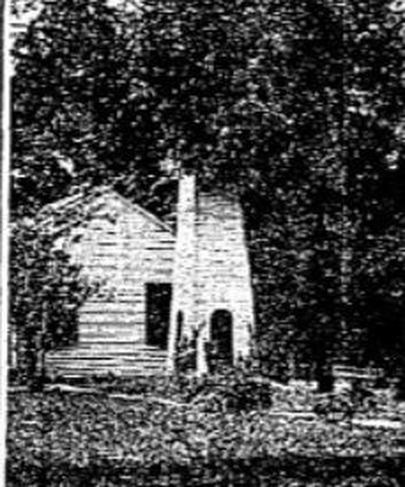 The original church located in what is now the St. Aloysius Cemetery on Central Avenue at Rollington Road. November 26, 1921 Courier-Journal.
The original church located in what is now the St. Aloysius Cemetery on Central Avenue at Rollington Road. November 26, 1921 Courier-Journal.
An article in the March 19, 1856 edition of the Louisville Democrat –most likely written by Catharine Warfield -- described what Pewee Valley was like in the days when Noble Butler was King:
Habits, Manners and Customs of the Pewee Nation – Coaches, Doctors, Post Offices, Churches, etc., etc.
Pewee Valley, March 10, 1856
Messrs. Editors: This celebrated valley is situated on a ridge. It is about 16 miles from Louisville, on the railroad between Frankfort and that place. I will say nothing, of course, about the train leading to such an important place, it must be of the best order, and the genuine politeness of the conductors is well known to all who have ever travelled that road – they seem to be preparing you for the cordial reception you will meet when you arrive at Pewee. So much has been said of the various beauties and pleasures of this place, that my readers will have to excuse me if I fail to give them anything original. With this apology, I will proceed.
The place does not attract attention on account of its longstanding – for it has been but lately settled – but for the new and startling ideas which it has originated. It is really true – however much the assertion may be doubted – that Peweeans have discovered it is possible to dance in calico dresses and ride in a one-horse sleigh. For fear our readers will suppose we are imbibing Hottentotish ideas, I will tell them that we should be perfectly willing to ride in a four-horse sleigh with buffalo robes, bells &c.; but we should not refuse a one-horse one, without the supposed necessary appendages, if the former were unattainable. Not the least pleasure of the sleigh rides were the upsets, and they were not unfrequent (sic) either, for it was very seldom that a party returned without having had an affectionate embrace with mother earth.
I think it must be the nature of a Peweean to love sleigh riding, for they practiced it perseveringly even after the snow had bid farewell. But, perhaps, some reader will remark that it is because they have no other vehicle. Now I beg leave to inform that person that he is mistaken, because we have others. Yes, the equipages of Peweeans are well known to all its visitors; but for fear you should know none of these visitors, I will tell you what they are: CARTS! – but you had better not call them so to a Peweean, here they are carriages – very good carriages, too – and if you don’t happen to sit over the wheels, you will ride very smoothly. Oh! It is enough to stir the hearts of the lookers-on (and the bodies of the riders) to see with what independence of character the Peweeans mount their carriages and roll off amidst the astonished gaze of all those who happen to be in the railroad cars.
As you descend from the cars, you find yourself upon a large platform, with a small white house before you. This is the station, store and post office of Pewee Valley. My heart swells with pride as a write the word POST OFFICE, as should every Peweean’s who is anxious for the prosperity of his country, home, village – I don’t know what to call it; for it is too small to be called CITY, and too important to be called village.
It is principally on account of this post office that I write this letter; for I think it is my duty to encourage the advancement of this place; and though my fingers tremble at the idea of these words appearing before the public, I still write on. The first house you perceive is Woodside Cottage, embowered by the tall trees, through which the summer sun steals and falls in broken fragments on the emerald grass.
As you look at its white walls gleaming amid the dark green leaves, you cannot help thinking it was one of the houses built by the fairies in olden times for their especial favorites. Not that it looks in the least antiquated, though, for it was built only a short time ago. The next house you come to is not celebrated for its beauty or singularity of architecture, but for a pair of ferocious dogs who never fail to welcome all passers-by and the effect of the meeting is really very “moving.”
Then comes Tuliphurst, the residence of Mr. Butler, who is so popular on account of his sociability and talents, that the inhabitants have placed him in the elevated position of King of Pewee Valley. The house abounds in little porches, which suggests how pleasant it must be to sit on them of a summer’s evening. Next is the Doctor’s house, which looks very comfortable, but still seems to want a female’s hand about it. The others are Vinona, Tangle-Dell, Owl’s Nest, and Undulata. The latter is the home of Mr. Gallagher, the poet. A more appropriate name could not have been chosen, and it shows Mr. Gallagher appreciated the singular beauty of the place when he named it.
On a hill a little beyond Mr. G’s is our church. We have a pulpit and a library, and I am anxiously awaiting a time when we shall have backs to our seats; but this is only when I am not there, for when listening to the eloquent sermons Mr. Wallace preaches every other Sunday, all discomforts are forgotten. There are no trees directly around the church, for we have to afford room for the numerous sleighs, CARRIAGES and horses that arrive after church, to talk while our gallants are preparing our CARRIAGES; and then we drive merrily home. It is not unusual for the lady to take the reins in her own hand, if she wishes to go, and has no gentleman to take her.
The guest of one is the guest of all in this delightful valley; and we have a welcome for all who come, provided they leave city airs behind them.
Long life to Pewee and may it ever prosper!
Teaching Career
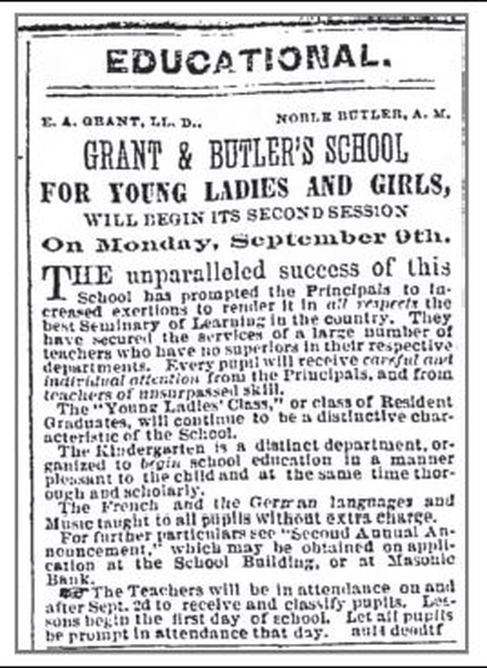 Advertisement for the second session of Grant & Butler's School for young ladies and girls from the August 24, 1867 Courier-Journal
Advertisement for the second session of Grant & Butler's School for young ladies and girls from the August 24, 1867 Courier-Journal
Marvin Ray Roach, writing for the April 20, 1941 Courier-Journal, discussed Butler's life and career as a teacher and textbook author. In his article,"Horses Got Oysters and Kids Got Morals; Louisville's Noble Butler was labeling his educational fables before McGuffey achieved fame," Roach noted that after his brother William's death:
... While the town talked of the murder, Noble Butler took his wife and children to Pewee Valley, where he wrote and cultivated flowers. After a few months he resumed his teaching in the city....
... Noble Butler's first private school was on Walnut at Center, now Armory Place. His next was on Walnut between 4th and 5th. He bought a home where the Drury Lane Theater now stands (Editor's note: 415 W. Walnut, now Muhammad Ali Blvd.) and built a third story onto the residence, for his classes.
Old clippings refer to his lovable qualities as a teacher. Mrs. (Edith Butler) Longest (a niece of Noble Butler) says he kept great quantities of roses in the classrooms. Besides teaching his own pupils, he headed the department of literature and elocution at the Kentucky Home School for Girls, when Miss Belle Peers, the founder, was principal...
Florence Dulaney Willis, whose father purchased Tuliphurst from Butler in 1864, claimed in Briney's 1926 article that he taught a school for girls in his study while living in Pewee Valley:
... the little white cottage (where Pewee Valley was named and was used by Butler as a study) still stands today as a guest house on the 22-acre estate of Mrs. Albert Willis and Miss May Dulaney.
According to Mrs. Willis, the study was the place where Noble Butler wrote his "Grammar" (Editor's note: "Introductory Lessons in English Grammar" was published nearly 20 years before the Butlers moved to Pewee Valley. "The Common School Speaker" and revised Goodrich Readers are the likelier candidates, because they were published in 1856 and 1857.) There he also conducted a school where starched-and-crinolined little girls of the "Valley" went obediently to learn the Three Rs...
... Mrs. Willis numbers among her prize (sic) possessions a letter from Noble Butler to her father, telling him of his daughter's excellent conduct and scholastic record while studying with him...
Butler's Pewee Valley school was, in fact, briefly mentioned in the March 19, 1856 Daily Courier:
The Accommodation Train will cause many improvements to be made along the Louisville and Frankfort Railroad this season. Already persons are looking for summer quarters for their families, and tasteful cottages near pleasant and shady groves, will more frequently gratify the sight before the present season closes. We noticed yesterday, that the buildings for Rev. McCown's school, in Tywopita Bend, near Hobb's Station (editor's note: a few miles from Pewee Valley in Anchorage), were rapidly going up. Not the least of the attractions of Pewee Valley and Tywopita Bend are the educational advantages they afford. Noble Butler's and Mr. McCown's schools are two of the very best in all the State.
As the father of three daughters and the husband of a highly educated woman, Butler advocated teaching women far more than just the social graces. And after what happened at Louisville High School, he may have thought better of teaching young men and found girls far more amenable -- and much safer -- to deal with! Two years after leaving Pewee Valley, he partnered with Prof. E.A. Grant on the "Grant and Butler School" for young ladies and girls. Plans for the new venture were announced in the May 7, 1866 Courier-Journal:
Profs. E. A. Grant and Noble Butler have leased for a term of years the large building on Sixth Street, between Walnut and Chestnut Streets, known as the Presbyterian Female Seminary .... Dr. Grant has for the past six or seven years been the efficient principal of the Louisville Male High School, and deserves great credit for his untiring devotion to the school. Mr. Butler is the author of one of the very best school grammars in the English language, and has for many years conducted a first-class school for girls in this city.
It is their intention, we learn, to employ teachers of the highest order of talent, and pay them liberal salaries. The propose to establish a complete graded school for girls in every stage of the educational progress, from the Primary Department to that of Resident Graduate. The building will be put in complete and useful order by the 1st of September, when school will be opened.
Profs. E. A. Grant and Noble Butler have leased for a term of years the large building on Sixth Street, between Walnut and Chestnut Streets, known as the Presbyterian Female Seminary .... Dr. Grant has for the past six or seven years been the efficient principal of the Louisville Male High School, and deserves great credit for his untiring devotion to the school. Mr. Butler is the author of one of the very best school grammars in the English language, and has for many years conducted a first-class school for girls in this city.
It is their intention, we learn, to employ teachers of the highest order of talent, and pay them liberal salaries. The propose to establish a complete graded school for girls in every stage of the educational progress, from the Primary Department to that of Resident Graduate. The building will be put in complete and useful order by the 1st of September, when school will be opened.
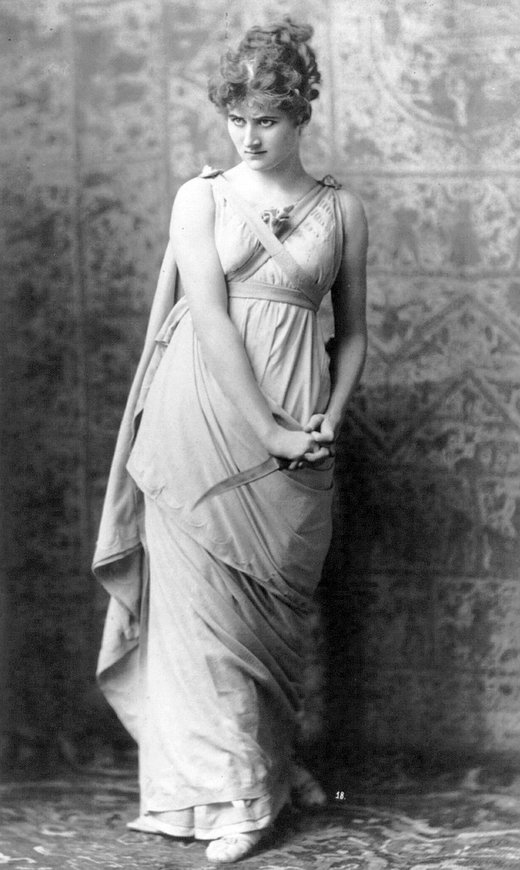 Noble Butler's most famous pupil was probably stage actress Mary Anderson. Library of Congress photo showing Mary Anderson as Parthenia in Friedrich Halm's "Der Sohn der Wildnis" ("Ingomar the Barbarian") photographed by Napoleon Sarony in 1883, the year after Butler died.
Noble Butler's most famous pupil was probably stage actress Mary Anderson. Library of Congress photo showing Mary Anderson as Parthenia in Friedrich Halm's "Der Sohn der Wildnis" ("Ingomar the Barbarian") photographed by Napoleon Sarony in 1883, the year after Butler died.
Butler's biography in "History of the Ohio Falls Cities and Their Counties: General history. History of Jefferson County, Ky. The history of Louisville" (L. A. Williams & Company, Clark County (Ind.); 1882), included this posthumous tribute to his teaching abilities from the Louisville Commercial:
...He was peculiarly an educator, having the rarest faculty of imparting his knowledge and possessing a perfect purity of mind and thought that made him the most valuable of instructors. He did more to plant a high taste for literature and a love of study in the minds of those who have been educated in Louisville during the past thirty years than could well be estimated. His education was almost universal in scope. Among his pupils was Mary Anderson, the actress, whose first studies in elocution were pursued under his care. He was a close and reverent student of Shakespeare, and taught the ambitious girl to read it correctly and to understand its meaning. All the brilliant young men of this city bear the impress of his pure taste and clear intellectual perceptions...
It was while teaching literature and elocution at Kentucky Home School for Girls that Butler first taught Mary Anderson. Supposedly, even after she became famous, whenever she undertook a major new role in a play, she still returned to Louisville to seek his advice. On June 28, 1890, the Courier-Journal ran a feature about "Our Mary" Anderson after her marriage to Antonio Fernando de Navarro. It took a look back on how her stage career began:
... Mary's first acquaintance with theatricals was in connection with a company of church amateurs in Louisville. She was a devout worshipper at the Catholic Cathedral there, and when a dramatic club was organized among the church's young people, Mary was one of its members. She was described at that time as a "tall, angular, awkward-looking girl," and the tradition runs that her first efforts in the acting line were something dire and awful; But she persevered until she made people listen to her claims. She was greatly assisted by Noble Butler ... He gave her lessons in elocution and taught her pretty much everything she knew when she first went on stage. It is said that the very first money she made in her profession was invested in a large oil portrait, which she gave to her old teacher...
...He was peculiarly an educator, having the rarest faculty of imparting his knowledge and possessing a perfect purity of mind and thought that made him the most valuable of instructors. He did more to plant a high taste for literature and a love of study in the minds of those who have been educated in Louisville during the past thirty years than could well be estimated. His education was almost universal in scope. Among his pupils was Mary Anderson, the actress, whose first studies in elocution were pursued under his care. He was a close and reverent student of Shakespeare, and taught the ambitious girl to read it correctly and to understand its meaning. All the brilliant young men of this city bear the impress of his pure taste and clear intellectual perceptions...
It was while teaching literature and elocution at Kentucky Home School for Girls that Butler first taught Mary Anderson. Supposedly, even after she became famous, whenever she undertook a major new role in a play, she still returned to Louisville to seek his advice. On June 28, 1890, the Courier-Journal ran a feature about "Our Mary" Anderson after her marriage to Antonio Fernando de Navarro. It took a look back on how her stage career began:
... Mary's first acquaintance with theatricals was in connection with a company of church amateurs in Louisville. She was a devout worshipper at the Catholic Cathedral there, and when a dramatic club was organized among the church's young people, Mary was one of its members. She was described at that time as a "tall, angular, awkward-looking girl," and the tradition runs that her first efforts in the acting line were something dire and awful; But she persevered until she made people listen to her claims. She was greatly assisted by Noble Butler ... He gave her lessons in elocution and taught her pretty much everything she knew when she first went on stage. It is said that the very first money she made in her profession was invested in a large oil portrait, which she gave to her old teacher...
Publishing Career
|
During a career that spanned four decades, Butler's pen was seldom idle. He frequently wrote articles for the local papers -- the Louisville Journal, the Daily Courier and the Louisville Democrat. From 1848-49 he was an editor of the Louisville Examiner, a four-page abolitionist weekly. He contributed to professional journals such as "Home and School" and was a corresponding editor for the Kentucky Teachers Association's first newspaper. He penned the occasional poem, as well, although verse was not his forte, as he admitted in the preface to his last book, "Butler's Miscellany," published two years before his death: ... The Muse's visits to me have been "short and far between." Whenever she came -- if it was the Muse that came --she saw how busy I was and would not take off her shawl and bonnet. But he was best known for his textbooks published by John P. Morton and Company/Morton & Griswold in Louisville as part of their American School Series. His first textbook was an English grammar, originally published in 1846 and revised in 1874. While living at Tuliphurst, he worked on "The Common School Speaker," published in 1856, and revised and improved S.G. Goodrich's school Reader series, published in 1857. Later, he developed his own series of readers, entitled "Butler's Readers." His texts were adopted by both public and private schools in Louisville and were widely used in schools across the South. Roach included several excerpts from Butler's edited Goodrich Fourth School Reader in his 1941 article. In the foreward, Butler expounded on the text's objectives: ... The foreward calls it "fitted to please, to attract, to excite the mind of the pupil; to rouse and develop his facilities; to inculcate moral principles; to establish a sense of virtue, a feeling of kindly charity, a reverence for religion, a nice regard for the rights, feelings, interest and character of others, a love for the works of nature and a reverent affection for their beneficent Author." Butler's Readers may have achieved most of these lofty aims, but his Grammar certainly didn't win him much in the way of reverent affection! Roach noted: ... (Professor Butler's English Grammar) was a hard text, and a terror for those who didn't like to study. Butler Longest, of Eastover Pk., is a great nephew of the author. He recalls that even in his own grade school days his popularity with the boys and girls was somewhat dimmed because of his kinship with the man who set such difficult tasks for them... Butler also used his Readers to battle backwoods speech: ... He cautioned students on pronunciation, in notes at the beginning of each chapter in his readers, such as " "Join, not jine; horse, not hoss; get, not git; saucy, not sarcy; Indians, not Injuns; oblige, not obleege." Also: "Busy doth rhyme with dizzy; food with brood and mood, but not with wood. "Rather with lather rhymes, but not with father. "Taunt rhymes with grant; pretty with witty, but not with jetty. ... the correct way to say haunt is "hant," for "Haunt rhymes with slant, but not with want".... |
|
Death
|
Grave Site at Cave Hill Cemetery |
Noble Butler died on February 12, 1882 -- Abraham Lincoln's birthday, an eminently suitable day for an abolitionist and father who sent two sons to fight for the Union during the Civil War. He made two requests regarding his funeral: first, that no eulogy be said, and second, "that his body might be encased in wood, so that it might soon become a part of the soil and quickly serve to nurture the beautiful flowers he loved so well." The February 15, 1882 Courier-Journal covered his service: FUNERAL OF NOBLE BUTLER ____________________ Attendance of a Large Concourse of Admirers of That Pure and Noble Gentleman ______________________ A TOUCHING INCIDENT The funeral of Prof. Noble Butler, which took place from Christ Church yesterday afternoon at 3 o'clock, was a very large and imposing one. The church was densely packed with the friends and admirers of the deceased long before the funeral procession arrived. A large number of floral offerings were spread upon the pulpit, the most noticeable one being a large arch with folding gates, which was placed on the left of the pulpit. At 3 o'clock the funeral procession entered the church and filed up the center aisle to the solemn music of the organ, preceded by Dr. Craik, who read the first part of the Episcopal funeral service. The pall-bearers were old old men who had been life-long friends and admirers of the deceased. Immediately after the pall-bearers came the relatives of the deceased, followed by a long line of school girls, each of them carrying a bunch of flowers. The coffin was placed in front of the alter and the flowers strewn over it until it seemed to be a bed of flowers. On the head of the coffin was placed a magnificent stand of white flowers, surrounded by a snow-white dove. Mr. Craik then proceeded with the funeral services, and at the conclusion said: "You all know, perhaps, that is the custom of our Church never to say a word of eulogy upon the |
dead. I will, however, relate one incident which occurred here, which will give you some idea of the character of the deceased. He attended a funeral in this Church, and I believe it was that of one of my own dear children, and at the conclusion of it he said to me, 'I feel as if I would like to go home and die and be buried by that service.'" The choir then sang the well-known hymn so full of beauty and pathos, "Asleep in Jesus," and as the slow procession marched out of the church, a beautiful solo was sung by one of the ladies.The remainder of the services, which were very short, were conducted at the grave.
According to Roach's 1941 article, when the hearse reached Beargrass Creek on Broadway, it halted a moment on the bridge where Butler often stopped on his walks to gaze at the water. A huge flower design was lettered: "In memory of Noble Butler, the educator of our children."
The next day, a tribute to him, written by some of his former students at the University of Louisville, ran in the Courier-Journal:
A Tribute to the Late Noble Butler
At a meeting of the old pupils of the Louisville College of the classes of 1839 to 1844, Messrs. T.L. Jefferson, Henry W. Ferguson, J.J. Harbison, W. George Anderson, Dr. Talbot Owen, and Patrick Joyes were appointed to draft a testimonial appropriate to the memory of Prof. Noble Butler, which is herewith presented:
In our boyhood days, when life was fresh and buoyant, it was our privilege to have Noble Butler as one of our preceptors at the old Louisville College, and there we first learned to know the good man, who has ever since commanded our highest admiration and love.
We found in Mr. Butler the ripe scholar, a teacher of surpassing excellence, an always kind, considerate, gentle friend, having withal a character transparent in its honesty, modest, unsuspicious, even child-like in its simplicity, yet always manly and true and refined to an exalted degree.
A student by nature, Prof. Butler's tastes and studies embraced all branches of literature, and in some departments he was a scholarly man of the highest type. His fame as a grammarian is coextensive of the land, and as a linguist he had few superiors, while in general knowledge, both literary and scientific, he had a well-stored mind, and through many years, up to the time of his death, he was regarded as an authority in the community in which he lived in matters pertaining to Belles-Lettres. No one has been so conspicuously regarded as an authority in the community as he with the educational interests of Louisville, and no one has done so much to further those interests. Widely known to almost all the older families of this community, with whom in some of the generations he had had professorial associations, it may be truly said that in every such household he was always received as a cherished friend and a most welcome guest. The children's children of his first pupils now re-echo the sentiments of their grand-parents and with one accord pay reverent homage to the memory of their old friend and teacher; the pure-minded, noble and Christian gentleman whose mortal form, worn out in a long, unselfish, useful and beautiful life of toil in the cause of high education and humanity, was yesterday laid away by loving hands amid heaps of beautiful flowers, the last offerings of love from the pure young hearts whom he delighted to lead in lessons of wisdom and truth.
It was the desire of Noble Butler, expressed to friends long ago, that when he should be called away from earth he might be buried in a casket of perishable material that as soon as possible his mortal remains might become constituent elements of the beautiful grass and flowers' and surely his memory will be ever green amid thousands of loving hearts, and fragrant with the flowers in which he now lies entombed.
We, his old pupils, who have followed him with interest and loving sympathy ever since our early association with him, and who know his great worth, will always remember with unfailing gratitude the beloved teacher and friend of our youth as well as our maturer years, whose faithfulness in his line of duty was only equaled by his high capacity and accomplishments.
In all his relations of his life -- in the family circle, where he was idealized head; as a citizen and as a friend -- Noble Butler performed his part well, and now rests from his labors, respected and lamented by all who knew him, leaving behind him the precious legacy of an honored and spotless name. Of no man can it more appropriately be said:
"None knew him but to love him;
None named him but to praise."
To the stricken family we tender our heartfelt sympathy.
T.L. Jefferson
Henry W. Ferguson
J.J. Harbison,
Dr. Talbot Owen
Patrick Joyes
W. George Anderson, Committee
According to Roach's 1941 article, when the hearse reached Beargrass Creek on Broadway, it halted a moment on the bridge where Butler often stopped on his walks to gaze at the water. A huge flower design was lettered: "In memory of Noble Butler, the educator of our children."
The next day, a tribute to him, written by some of his former students at the University of Louisville, ran in the Courier-Journal:
A Tribute to the Late Noble Butler
At a meeting of the old pupils of the Louisville College of the classes of 1839 to 1844, Messrs. T.L. Jefferson, Henry W. Ferguson, J.J. Harbison, W. George Anderson, Dr. Talbot Owen, and Patrick Joyes were appointed to draft a testimonial appropriate to the memory of Prof. Noble Butler, which is herewith presented:
In our boyhood days, when life was fresh and buoyant, it was our privilege to have Noble Butler as one of our preceptors at the old Louisville College, and there we first learned to know the good man, who has ever since commanded our highest admiration and love.
We found in Mr. Butler the ripe scholar, a teacher of surpassing excellence, an always kind, considerate, gentle friend, having withal a character transparent in its honesty, modest, unsuspicious, even child-like in its simplicity, yet always manly and true and refined to an exalted degree.
A student by nature, Prof. Butler's tastes and studies embraced all branches of literature, and in some departments he was a scholarly man of the highest type. His fame as a grammarian is coextensive of the land, and as a linguist he had few superiors, while in general knowledge, both literary and scientific, he had a well-stored mind, and through many years, up to the time of his death, he was regarded as an authority in the community in which he lived in matters pertaining to Belles-Lettres. No one has been so conspicuously regarded as an authority in the community as he with the educational interests of Louisville, and no one has done so much to further those interests. Widely known to almost all the older families of this community, with whom in some of the generations he had had professorial associations, it may be truly said that in every such household he was always received as a cherished friend and a most welcome guest. The children's children of his first pupils now re-echo the sentiments of their grand-parents and with one accord pay reverent homage to the memory of their old friend and teacher; the pure-minded, noble and Christian gentleman whose mortal form, worn out in a long, unselfish, useful and beautiful life of toil in the cause of high education and humanity, was yesterday laid away by loving hands amid heaps of beautiful flowers, the last offerings of love from the pure young hearts whom he delighted to lead in lessons of wisdom and truth.
It was the desire of Noble Butler, expressed to friends long ago, that when he should be called away from earth he might be buried in a casket of perishable material that as soon as possible his mortal remains might become constituent elements of the beautiful grass and flowers' and surely his memory will be ever green amid thousands of loving hearts, and fragrant with the flowers in which he now lies entombed.
We, his old pupils, who have followed him with interest and loving sympathy ever since our early association with him, and who know his great worth, will always remember with unfailing gratitude the beloved teacher and friend of our youth as well as our maturer years, whose faithfulness in his line of duty was only equaled by his high capacity and accomplishments.
In all his relations of his life -- in the family circle, where he was idealized head; as a citizen and as a friend -- Noble Butler performed his part well, and now rests from his labors, respected and lamented by all who knew him, leaving behind him the precious legacy of an honored and spotless name. Of no man can it more appropriately be said:
"None knew him but to love him;
None named him but to praise."
To the stricken family we tender our heartfelt sympathy.
T.L. Jefferson
Henry W. Ferguson
J.J. Harbison,
Dr. Talbot Owen
Patrick Joyes
W. George Anderson, Committee
His wife, Lucinda Butler, died a year later, on March 7, 1883:
Courier-Journal
March 8, 1883
DEATH OF MRS. BUTLER -- Lovable Woman, Wife and Mother Passes Away in Peace to Her Eternal Home -- Mrs. Lucinda Butler, widow of the late Nobel Butler, died at her residence on Walnut street, near Fourth avenue, Tuesday afternoon at 2:30 o'clock. Her death occurred in the seventy-second year of her age, and was the result of general debility and a complication of lung troubles.
The deceased, though not born in Louisville, lived here nearly all her life and was a native Kentuckian. She was sister of the late Col. John H. Harney, the founder and editor of the old Louisville Democrat. In the twenty-seventh year of her age, she was married to Prof. Noble Butler, with whom she lived forty-five years of a happy wedded life. His death, which occurred a little over a year ago, left her inconsolable, and this severe affliction, from which she never recovered, undoubtedly hastened her demise. Mrs. Butler was very widely known, and of her it can truthfully be said that she was beloved by all who her enjoyed her acquaintance, and she left none behind who do not mourn her departure. Her virtues were of that unobtrusive character which shuns rather than seeks recognition; but, in spite of all her modesty, her worth was as widely known as she was herself. A woman of a naturally brilliant intellect, she had received a liberal and polished education for one of her sex, which made her a fitting companion for her husband, one of Kentucky's ablest scholars. She never mingled much in the society she was so well fitted to adorn, but was contented in the family circle. Mrs. Butler was a consistent member of the Unitarian church, in which faith she had been a devout believer for many years. The funeral took place from the family residence, on Walnut street, yesterday afternoon. Rev. Craik, rector of Christ Church, officiating....
Courier-Journal
March 8, 1883
DEATH OF MRS. BUTLER -- Lovable Woman, Wife and Mother Passes Away in Peace to Her Eternal Home -- Mrs. Lucinda Butler, widow of the late Nobel Butler, died at her residence on Walnut street, near Fourth avenue, Tuesday afternoon at 2:30 o'clock. Her death occurred in the seventy-second year of her age, and was the result of general debility and a complication of lung troubles.
The deceased, though not born in Louisville, lived here nearly all her life and was a native Kentuckian. She was sister of the late Col. John H. Harney, the founder and editor of the old Louisville Democrat. In the twenty-seventh year of her age, she was married to Prof. Noble Butler, with whom she lived forty-five years of a happy wedded life. His death, which occurred a little over a year ago, left her inconsolable, and this severe affliction, from which she never recovered, undoubtedly hastened her demise. Mrs. Butler was very widely known, and of her it can truthfully be said that she was beloved by all who her enjoyed her acquaintance, and she left none behind who do not mourn her departure. Her virtues were of that unobtrusive character which shuns rather than seeks recognition; but, in spite of all her modesty, her worth was as widely known as she was herself. A woman of a naturally brilliant intellect, she had received a liberal and polished education for one of her sex, which made her a fitting companion for her husband, one of Kentucky's ablest scholars. She never mingled much in the society she was so well fitted to adorn, but was contented in the family circle. Mrs. Butler was a consistent member of the Unitarian church, in which faith she had been a devout believer for many years. The funeral took place from the family residence, on Walnut street, yesterday afternoon. Rev. Craik, rector of Christ Church, officiating....
Photos from Tuliphurst's Nomination to the National Register of Historic Places, 1989
Related Links:

